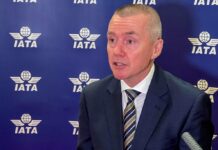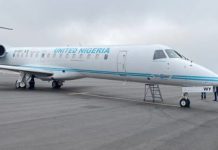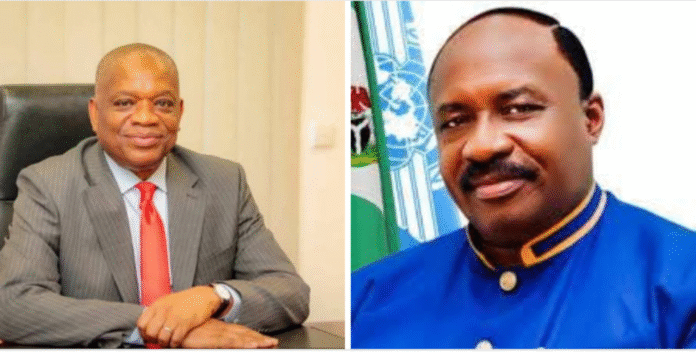The Nigeria Civil Aviation Authority (NCAA) has expressed concern about comments made by the representative of Abia North in the senate, Mr Orji Kalu, regarding alleged inadequacies in pilot preparation, claims of substance use among flight crew, and supposed lapses in the Authority’s oversight responsibilities.
The senator and owner of the defunct Slok Air had yesterday claimed in his contribution to a motion on the need to strengthen aviation safety in Nigeria that some pilots flying aircraft in Nigeria smoke Indian hemp and before operating flights.
He said this was one of the major reasons many aircraft skid off the runway during landing.
The former two-term governor also lashed out at aviation regulatory agencies for allegedly failing to properly monitor pilots, claiming that poor oversight had led to unsafe practices.
“I feel that the authorities guiding these pilots, some of them are very lousy. I’ve on many occasions stopped to fly because of the inadequacy of the pilots’ preparation. Some of the pilots are not prepared. Some of them use Indian hemp. Yes, it’s true. Some of them smoke Indian hemp, and some of them are not properly audited by the authorities.
“…The NCAA and the Nigerian Airspace Management Agency (NAMA) and other authorities are not looking after these pilots and checking them for drugs, on the sport assessment. They’re not doing it because it is dangerous, and you see them walking into the airplane, nobody checks their blood pressure, nobody checks anything, nothing, nothing,” he said.
Kalu further said modern aircraft, such as Boeing 737-500, are largely automated and should rarely encounter landing problems. He attributed incidents to pilot negligence and drug use.
“Note that aircraft, most of them, 737-500, have an automatic landing gear system. It doesn’t need a pilot to land the plane. What is needed to land the plane is a computer and, autopilot. Because some of them are high, they are not going to do this thing. Because any aircraft that is of a new generation doesn’t need a pilot. They don’t need a pilot to fly. Landing and take-off are purely automatic.
“So most of these pilots are so careless. I have witnessed, I have seen by myself, I have come to fly, I told my pilots, I said, No, no, no, I don’t think you’re normal today. You have to go back home. So all these agencies must come back home to look after these pilots, and what do you call them, and the cabin staff, because some of them take this Indian hemp like cigarettes. They won’t tell you. If you go close to them, you will smell it,” he added.
The senator therefore charged the NCAA to “come back to its duty” while the minister of aviation “must be forced to do a quarterly (review) of the runway” because “some of the runways are not in good shape.”
Reacting to the comments, the director general of the NCAA, Capt Chris Najomo, said in a statement that the concerns expressed by the Abia North lawmaker “do not reflect the factual state of regulatory practice in the Nigerian aviation sector.”
He said the Authority maintains a rigorous and internationally recognised system for certifying and monitoring the medical and professional fitness of all pilots operating in the country.
Najomo described as “inaccurate” the suggestion that “pilots operate under the influence of substances or without adequate checks.”
The statement reads: “The Nigeria Civil Aviation Authority (NCAA) has noted with concern the comments made by Distinguished Senator Orji Uzor Kalu on the floor of the Senate regarding alleged inadequacies in pilot preparation, claims of substance use among flight crew, and supposed lapses in the Authority’s oversight responsibilities.
“While the Authority holds the Distinguished Senator and the National Assembly in the highest esteem, it is necessary to provide factual clarifications in the public interest.
“Contrary to the impression created, the Nigeria Civil Aviation Authority maintains a rigorous and internationally recognised system for certifying and monitoring the medical and professional fitness of all pilots operating in Nigeria.
“No pilot is permitted to operate a Nigerian-registered aircraft without holding both a valid pilot licence and a current medical certificate, as required by the Nigeria Civil Aviation Regulations (Nig. CARs) Part 8.4.1.4.
“Holders of Commercial Pilot Licences (CPL) and Airline Transport Pilot Licences (ATPL) are, by the provisions of Nig. CARs 2.3.5.1 and 2.3.7.1, required to possess a Class 1 Medical Certificate before they are allowed to operate.
“These medical certificates are issued only after comprehensive aero-medical evaluations by NCAA Authorised Aviation Medical Examiners (AAMEs) followed by approval of the medical report by NCAA’s in-house aero-medical assessors.
“The scope of these examinations is extensive. It covers cardiovascular, neurological, psychological, metabolic, respiratory, and visual assessments to ensure that the pilot is fit to operate an aircraft safely. Nig. CARs Part 2.11.2.6(b) details the physical and mental requirements that must be met before a medical certificate is issued.
“The regulation makes it clear that an applicant must not suffer from any disease or condition that could suddenly render them unable to perform flight duties safely. It also screens for the use of psychoactive substances, mental or behavioural disorders, abnormal blood pressure, heart or lung diseases, neurological disorders, and other physiological conditions that could affect safe performance.
“Medical certificates are valid for twelve months for pilots under 40 years of age and six months for those aged 40 and above. At the expiration of these periods, pilots must undergo a new series of medical tests before their certificates can be renewed.
“In addition to this, Nig. CARs Part 8.5.1.5 explicitly prohibits any crew member from acting as a flight crew member within eight hours after consuming alcohol, while under the influence of alcohol, or while using any psychoactive substance that could affect alertness, judgement, or performance.
“In accordance with this regulation, NCAA carries out on-the-spot alcohol or drug testing when there is reasonable suspicion of intoxication. It further authorizes random and unannounced testing for crew members and allows the results of such tests to be used as legal evidence.
“Beyond the medical certification process, NCAA inspectors conduct daily ramp inspections at airports across the country. These inspections are not limited to aircraft alone; they include direct engagement with flight crew.
“During these inspections, inspectors verify crew licences, medical certificates, and general fitness for duty. Any irregularity is immediately addressed, and appropriate enforcement action is taken in line with the Authority’s zero-tolerance policy for safety violations.
“Only recently, in August 2025, the NCAA suspended the licence of a ValueJet pilot for initiating departure procedures without proper clearance, an example that underscores the Authority’s uncompromising commitment to safety and discipline.
“It is therefore inaccurate to suggest that pilots operate under the influence of substances or without adequate checks. The processes in place are not only thorough but also consistent with global standards prescribed by the International Civil Aviation Organization (ICAO).
“Nigeria’s aviation oversight system has consistently met ICAO audit requirements under the Universal Safety Oversight Audit Programme (USOAP), placing the country among those maintaining effective safety supervision systems.
“With regard to the senator’s comments suggesting that modern airplanes take off and land automatically, the Authority wishes to clarify that while many modern aircraft are equipped with advanced autopilot and autoland systems, these systems do not replace pilot control.
“Take-offs are entirely manual operations carried out by the flight crew. Autopilot functions are only activated after take-off, usually when the aircraft reaches a safe altitude.
“Similarly, although some aircraft have autoland capabilities, these are used only under specific weather and airport conditions and always under pilot supervision.
“Nigeria does not currently have any airport certified for Category III (CAT III) operations, which are required for fully automatic landings in low-visibility conditions. Therefore, all landings within Nigerian airspace are manually executed by pilots.
“The NCAA remains proud of its safety oversight record and the professionalism of Nigerian flight crew. The Authority continues to uphold the highest standards of safety through continuous inspections, random substance testing, enforcement actions, and strict adherence to ICAO provisions.
“The NCAA reiterates that the safety of air transport operations in Nigeria remains paramount and uncompromised. The Authority has never and will never tolerate any act that endangers public confidence in the aviation system.
“The concerns expressed by the Distinguished Senator are duly noted; however, they do not reflect the factual state of regulatory practice in the Nigerian aviation sector. The NCAA remains open to constructive engagement with the National Assembly and all stakeholders to strengthen the safety, security, integrity, and global reputation of Nigeria’s air transport industry.”

























































